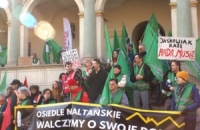In the world of paper money and oceans of debt there is nothing good waiting for us. The easiest way of dealing with that should include gradual disconnection from the system.
Theory in movement, movement in theory
Stephen Shukaitis, David Graeber - Practice as a form of knowledge, knowledge as a form of action
Involved, collective research increases antagonism to new levels of understanding, creating words which come from direct resistance and become reality. It is not an avant-garde intellectual practice, but a process, in which we are collectively thinking and progressing together, accepting that the answers to questions about future activity are never easy, sure and true forever.
Georgy Katsiaficas - Autonomy and the left
Both anarchism and Marxism were created from the need to summarize the experience of the unsuccessful revolutions of 1848. The reasons for that defeat can be found partly in their theoretical imperfection. Their drawbacks have to be understood as a part of historical analyses, not only as a part one's own theory. Nowadays, because of the lack of knowledge about the movements from 1848, the theories have become empty shells of formal logic, that could have been used anywhere, and have not been brought to life.
Jaroslaw Urbanski - Anarchism – crisis and transformation
The development of anarchist ideas is not linear or cumulative, but more „jumpy”. All of the phases of the movement so far have been kind of a different sphere, where the „old” practical and theoretical experiences have had a limited use. Thoughts become abandoned; they only define the discourse up to some point, and then they become dead weight.
Veronika Sinewali - About the syndromes of anarchist movement in Poland
Thinking about the rebirth of the radical anti-authoritarian social movement, anarchists should focus on putting the theory of radicalism into practice. Conscious radicalizing of one's own actions and therefore popularizing radical forms of intervention, self-defense and taking collective control over social processes among the exploited and repressed classes of the society is a practice that has been seriously neglected.
Andrzej Smosarski - The other politics
Three decades of the neo-anarchism activity in Poland have not caused any fundamental debate on the methods of activity. There was no chance for that, since the movement was dominated by the fanatics of philosophical literature and riots, and the ultra-liberals and quasi-communists hidden under the same banner were pulling the politics of the movement to two different directions.
10 years after Seattle
Richard Day - Anarchism, indigenism and anti-globalization in North American social movements
What is the most interesting in the modern North American radical activism is the fact that some groups act for the radical change, but they are not trying to obtain it through taking over the state power or influencing the so-called civic society.
Michael Hardt, Antonio Negri - What the protesters in Genoa want?
The protests have become a global movement and their main aim is the democratization of the globalization processes.
Massimo De Angelis - From movement to society
In the social actions of the movement, including interactions of its internal differences, the dichotomy between the state and the market is a false opposition. In the network of worldwide movement, the social cooperation imposes its own rules through rank-and-file democracy, consensus, dialogue and getting to know other people.
Werner Bonefeld - Notes on movement and uncertainty
The struggle for a democratic self-organization of the society includes politicization of social relationships and therefore getting rid of concentrated politics in the form of the state.
We are acting in the streets, where the real society is. Interview with Greek anarchists
Spectacular actions are only the top of the pyramid. On the bottom of it there are thousands of actions in the streets. The movement has a social character. We are not closed, we shout to the people "Come join us!"
Grzegorz Piotrowski - Marginalization of alterglobalist movements based on media coverage of the Prague and Warsaw protests
There is an essential pressure of media on presenting the anti-capitalist movements as those which are full of violence, therefore those that are not meant to be partners in the discussion. We can distinguish a tendency to oppose radical movements to the groups creating the so-called civic society.
Piotr Ciszewski - Violence in social protests in Poland after 1989
Social protests that have taken place in Poland since 1989 have been mostly very limited considering their forms. Despite that, since the beginning of the transformation there are numerous examples of protests that have went beyond those scheme, often including the use of violence by the protesters.
The limits of insurrection
Alfredo M. Bonanno - From riot to insurrection
Analysis of the post-industrial capitalism from the anarchist perspective. Two complex analyses by one of the most famous representatives of the insurrectionary anarchism.
Joe Black - Anarchism, insurrections and insurrectionalism
Insurrectionalism accurately criticizes most of the standard leftists practices. Although it is mistaken in attempting to impose these critiques on all forms of anarchist organization.
José Antonio Gutiérrez - Notes on insurrectionalism
It is worth discussing insurrectionalism nowadays, not because of the critics of the anti-authoritarian organizations or the left that it is making, but because it is a reflection of our historical mistakes and faults.
Reclaim the streets
Cindy Milstein - Reappropriate the imagination! Thinking through art
Why can't art created by the anti-authoritarians be provocative, benevolent and innovative - even when it is composed from materials found in the garbage?
Eric Lyle - Shadows in the streets: the stencil arts of the new Argentina
Can you really see the "revolution" painted on the walls of Argentina? If so, what kind of revolution was that? I found a stencil artists of Buenos Aires to find out.
Josh MacPhee - Street art and social movements
When most people start to feel that there is no other way to communicate, that the media channels designed for them are working only one way, and they are only the recipients of a chain of lies, street art can be the antidote used as a mechanism of social control.
Faith Denham - Sanctioned & unsanctioned art in public space
Increasingly, public space is shrinking, morphing into ‘public-use’ or ‘public-access’ space. It is progressively subject to surveillance and control where even minor deviation from the conventional established social standards becomes illicit, and commercial codes of conduct are enforced.
Radek Błoński - The criticism of every day life in artistic practice of street artists
Critical art is supposed to express opposition to reality, it is confirmed in the need to comment on the social, political, consumerist and media reality.
Spectators of their own life
Andrzej Nowak - Poor inhabitants of Warsaw look at the homeless
The movie "Boisko bezdomnych" ("Playground of the homeless") unintentionally reveals the cruel mechanisms of exclusion and the ways to ideologically hide that fact.
Remigiusz Kasprzycki - The consumed – one of the answers why there is an economic crisis
Review of the book by Benjamin R. Barber "Consumed: How Markets Corrupt Children, Infantilize Adults, and Swallow Citizens Whole".



